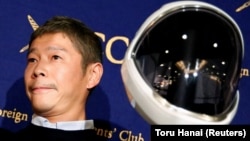A Japanese businessman is giving away $9 million to his followers on social media in what he is calling a “social experiment.” He hopes to see whether the money increases people’s overall happiness.
Yusaku Maezawa will give $9,000 to 1,000 followers chosen at random from people who retweeted his January 1 message on Twitter. The money’s effect on the winners will be studied over time through questionnaires.
“It’s a serious social experiment,” said the businessman on YouTube, adding that he hopes it will interest both researchers and economists.
Yusaku Maezawa rose to fame in the Japanese fashion industry at an early age. He became rich thanks to Zozotown, a website that specializes in clothing sales.
Maezawa is known for his high spending on art and sports cars but also his love for sharing ideas, like a world without money. In addition, he was chosen to be the first private passenger to fly around the moon with Elon Musk’s SpaceX.
With his giveaway, Maezawa hopes to spread the idea of basic income, or the theory of giving periodic payments to all citizens. The idea has gained attention in some political circles, even in the United States. A leading supporter is businessman Andrew Yang, a candidate for the Democratic Party’s presidential nomination.
“Basic means a regular minimum amount offering a sense of security. What Maezawa is offering is totally different,” said Toshihiro Nagahama. He is an economist with the Dai-ichi Life Research Institute.
Maezawa said that since he “has the money and free time” to make the payments, he is trying to fuel a debate in Japan over the value of a basic income.
The idea of a universal basic income has gained support because of fears that technology will replace large numbers of jobs. But for now, that concern is not as big an issue in Japan with its low unemployment rate, said Nagahama.
This is the second, larger, giveaway by Maezawa. In November, he got $900 million from the sale of his online fashion business.
Maezawa now has seven million Twitter followers. His tweets are an interesting mix of subjects, including his pricy purchases and thoughts on the meaning of life. He also recently made news headlines after his split from actress girlfriend Ayame Goriki.
These days, he can also be found on YouTube, sharing things like a look into his private plane and a visit to the barber shop to get his hair colored. He even shared a video of him working on his finances after the November sale of his company.
The debate over basic income comes as income inequality continues to grow in the United States. In recent years, some very wealthy Americans have promised to give away most of their wealth. They include Microsoft co-founder Bill Gates and investor Warren Buffett.
I’m Alice Bryant.
Sam Nussey wrote this story for Reuters News Agency. Alice Bryant adapted it for VOA Learning English. George Grow was the editor.
______________________________________________________________
Words in This Story
overall – adj. general or universal
retweet – v. to forward or report a message on Twitter
post – n. a piece of writing, picture or something else published online
random – adj. chosen or done without a particular plan
income – n. money earned from work, business or investments
regular – adj. structured, normal or systematic
minimum – n. the lowest number or amount that is possible or permitted
barber – n. a person whose job is to cut men’s hair





